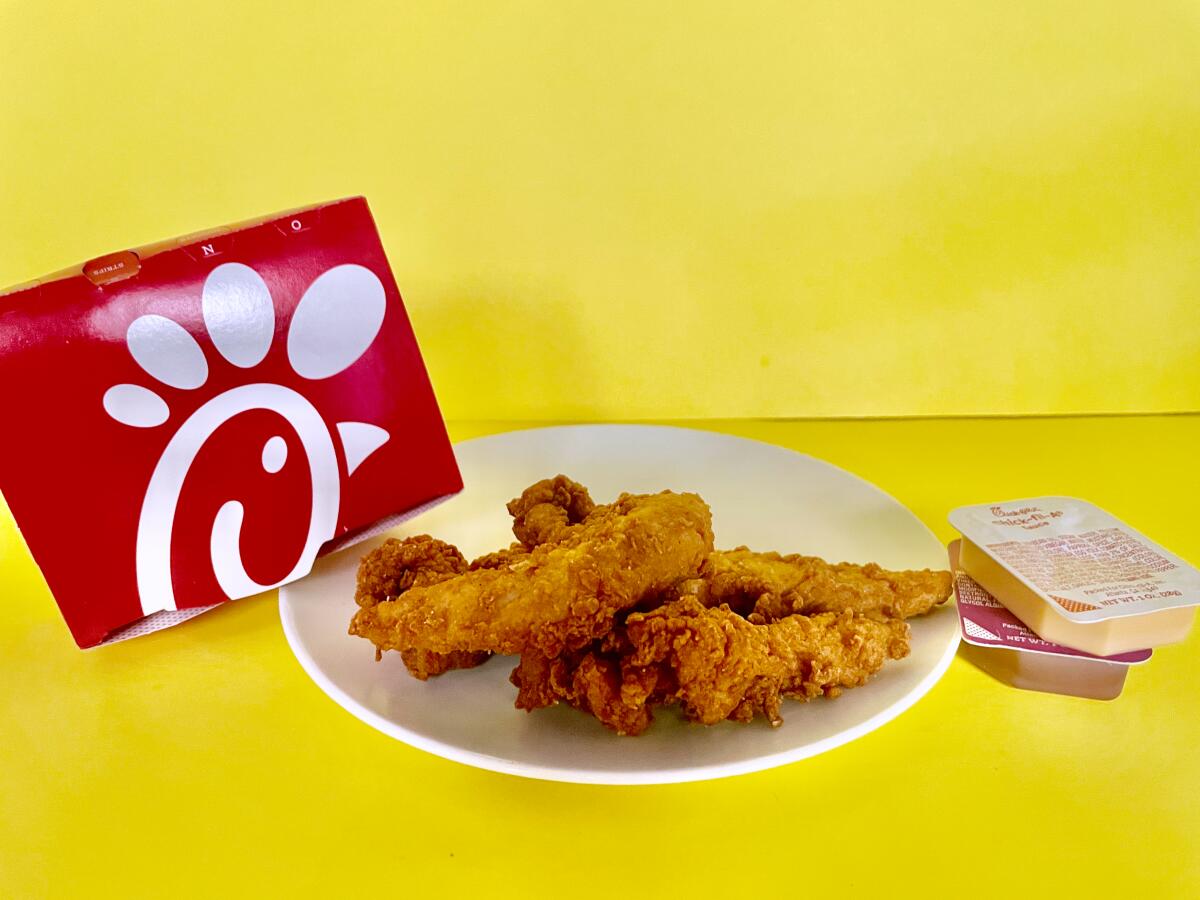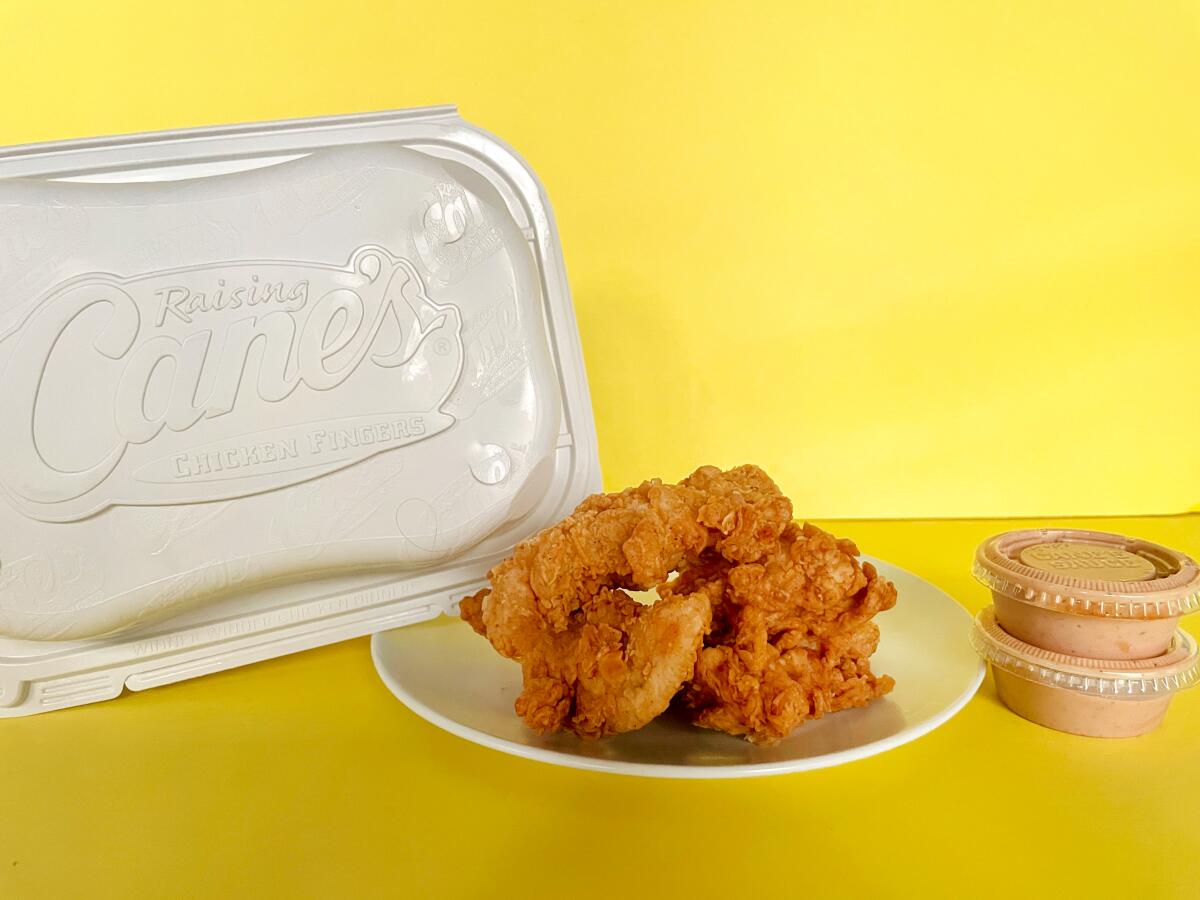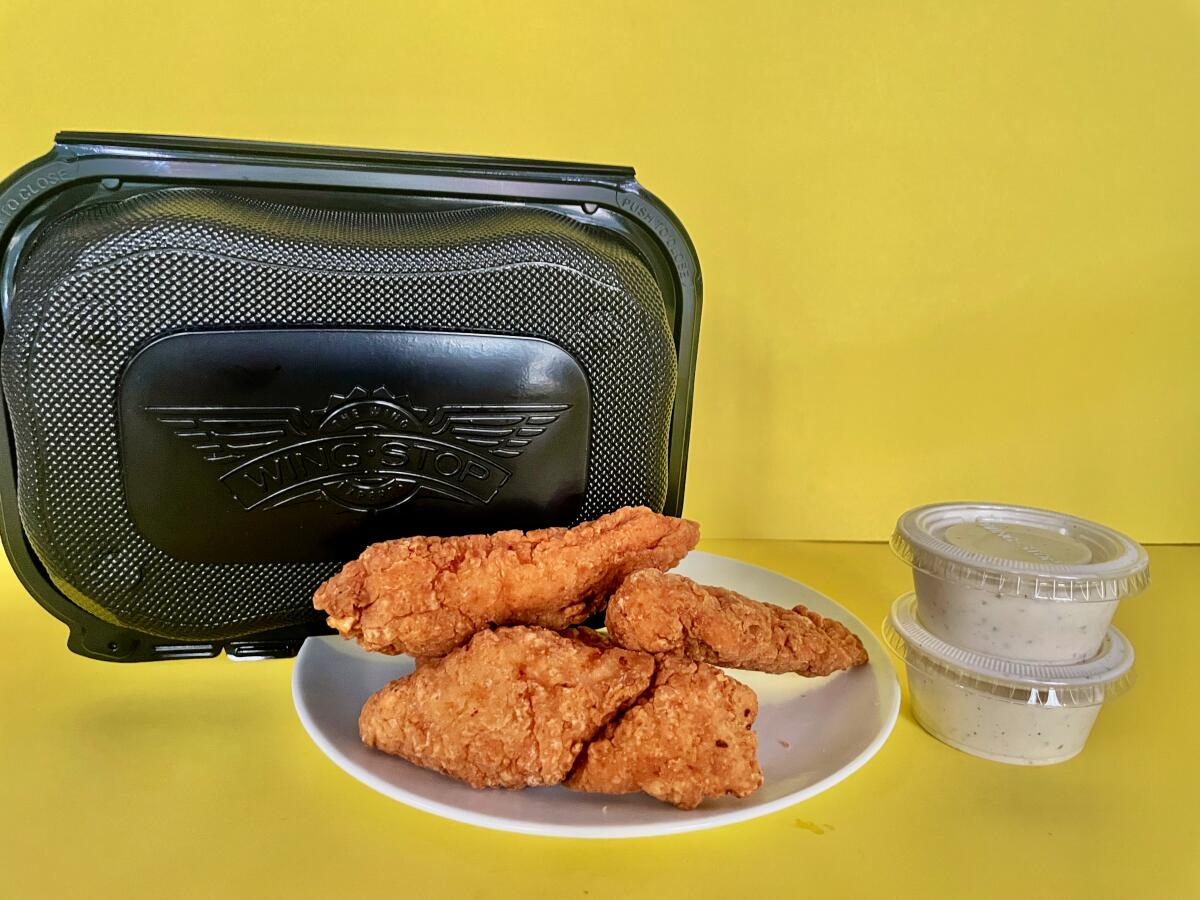
Is it a chicken tender, finger or strip?
Whatever you call your breaded and fried belts of boneless chicken, there are entire restaurants devoted to them. Once relegated to the kid’s menu, chicken tenders are behind some of the most successful restaurant chains in the world.
This year, revenue at fast food chicken restaurants is expected to reach $61.1 billion.
Their inherently bland nature only contributes to their broad appeal, making tenders the perfect vessel for an infinite number of seasonings and condiments.
While it may seem like they’ve been around forever, there’s a restaurant in Manchester, N.H., that claims to have invented the fried chicken tender in 1974.
Burger King released its first chicken tenders in the ‘80s, and other fast food chains followed suit. In 1996, Todd Graves opened the first Raising Cane’s at Louisiana State University in Baton Rouge, introducing diners to an entire restaurant that celebrates the tender.
If we’re talking about pieces of boneless chicken, I’ve always preferred tenders to nuggets. Because of their shape and size, I tend to trust that they’re whole pieces of meat instead of pressed and formed hunks of chicken. With so many restaurants serving them, Deputy Food editor Betty Hallock and I decided to conduct our own taste test. We ordered the chicken tenders at 11 chains, including Raising Cane’s, Chick-fil-A and Kentucky Fried Chicken. We sampled them side-by-side for the most accurate evaluation of temperature and textures. Prices will vary based on your location, if you order delivery or eat in-store.
Let the tender wars begin.
11. Burger King chicken fries

What we paid: $3.39 for four fingers
These were so disappointing, we contemplated leaving them out of the ranking altogether. They were tiny, placid tubes of chicken that resemble fingers far more than any other chicken “finger.” And they tasted like long, rubbery nuggets. An order of four felt like the light snack you might eat while you assemble a real snack. The Zesty dipping sauce was heavy on the horseradish, but not compelling enough to save the fries from eternal chicken tender damnation.
10. Jack in the Box crispy chicken strips

What we paid: $11.11 for five chicken strips
These actually looked really appetizing with a nice golden color and a noticeably shaggy crust. But as soon as we took our first bites, the illusion of greatness crumbled. They were greasy to the touch. And the bitter taste of old grease was the dominant flavor. The coating was crunchy, but had an odd fluffy texture to it with breading that was far too thick. Once you got past the fortress of breading, the chicken did taste like real chicken.
9. Chick-fil-A Chick-n-Strips

What we paid: $12.09 for four strips
I’m still perplexed by the popularity of Chick-fil-A, and even more so after trying their strips. Last year, the brand reported nearly $22 billion in sales. Every time I pass a location the line extends beyond the driveway and into the street. It is the only thing my friend’s kids will eat with enthusiasm. Maybe it’s because the tenders taste like they’ve been dipped in sugar. So much so that Hallock commented mid-bite: “Why am I eating a cookie?” Both sugar and sugar syrup are listed in the ingredients. The chicken was moist with no oily aftertaste, but we couldn’t get over the sweetness of the tenders. The Chick-fil-A sauce, thick and gloppy and even sweeter, only made things worse.
8. Chicken Guy! fried tenders

What we paid: $12.42 for five tenders
Chicken Guy! is the new chicken tender and fries restaurant from Guy Fieri, the spiky-haired host behind most of the shows on the Food Network. Fieri’s tenders are wide and flat, resembling pounded and breaded chicken cutlets. There was a nice amount of seasoning and what tasted like a panko-crust coating that stayed impressively crunchy, but they also registered as too sweet, and the chicken was tough.
7. Jollibee chicken tenders

What we paid: $21.24 for six tenders
I’ve had great fried chicken at Jollibee, the Filipino fast food chain known for its chicken, gravy and spaghetti. I had high hopes for the brand’s tenders, which were varied in shape and size, more like odd strips and blobs that were battered and fried. The coating wasn’t too heavy, but any seasoning or real flavor was masked by the overwhelming taste of fry oil. It bordered on rancid, but the chicken inside was tender and juicy.
6. Kentucky Fried Chicken chicken tenders

What we paid: $12.92 for four tenders
The tenders had the same shaggy coating and seasoning as the chain’s bone-in fried chicken, which meant that they were relatively crunchy and very salty. The chicken was tough, and you could pull away strips like string cheese. Both the KFC sauce and Comeback sauce were too sweet. Gravy is the better dipping option, though it’s a tad watery.
5. Church’s Texas Chicken tenders

What we paid: $6.99 for five tenders
These were the least memorable of the bunch, but not terrible. They had a pale, crisp coating and not a lot of seasoning. Dipping sauce is required, but you may want to source it from another restaurant. The gravy tasted like salty brown water, and the signature hot sauce is more sweet than heat.
4. Carl’s Jr. hand-breaded tenders

What we paid: $12.49 for five tenders
These tenders looked like something you might get on the kids menu at a restaurant. They were perfectly golden with a craggy coating. The meat tasted like juicy strips of chicken breast. The only problem is you need to eat them immediately. They didn’t retain their crunch as well as some of the others. Carl’s Jr. also gets extra points for its barbecue sauce.
3. Raising Cane’s chicken fingers

What we paid: $8.36 for four fingers
The chicken tastes and feels like actual chicken. And though the coating doesn’t grip the meat as well as I’d like, it’s crunchy and stays crunchy. The fingers are a little bland, but that’s what the Cane’s sauce is for. It’s like a creamy, extra peppery Thousand Island with a nice hit of acid that makes your lunch of chicken fingers and fries feel a little less heavy.
2. Popeyes chicken tenders

What we paid: $10 for five tenders
The Popeyes tenders are for those who prioritize the crunch factor when evaluating fried chicken. The coating creates a crisp, jagged armor around each piece. It’s well seasoned and gives the chicken an almost buttery flavor. Some pieces are plump and moist, others seem to be giant shards of crunchy coating. They register as more of a crunchy snack than a meal. No dipping sauce is required, but the Bayou Buffalo is pretty tangy.
1. Wingstop crispy tenders

What we paid: $8.99 for four tenders
I went back and forth between Wingstop and Popeyes for the top spot. I prefer the crunch of Popeyes, but the tenders at Wingstop taste the most like real, meaty, juicy strips of chicken. They’re substantial enough for a full meal. The coating can be a little uneven, with some parts thin and crisp and others clumpy, but overall the tenders offer a nice crunch. And if you’re a fan of ranch dressing, there’s no comparison. The Wingstop ranch is the ideal consistency, thick enough to coat your tender but not enough to be considered gloppy. It tastes like the Hidden Valley ranch seasoning packet with onion, garlic and herbs. We both agreed that these were the tenders we’d order again. And we ended up dipping all the other tenders in the Wingstop ranch.